-
ORIGINAL ARTICLE11-22-2024
Temporal trends in neonatal mortality in Pernambuco
Revista Brasileira de Enfermagem. 2024;77(4):e20230451
Abstract
ORIGINAL ARTICLETemporal trends in neonatal mortality in Pernambuco
Revista Brasileira de Enfermagem. 2024;77(4):e20230451
DOI 10.1590/0034-7167-2023-0451
Views0See moreABSTRACT
Objective:
To verify the temporal trend of neonatal mortality in the health regions of Pernambuco between 2000 and 2020.
Method:
A time-series ecological study was conducted, analyzing the total neonatal mortality rate and its early and late components. For regression analysis, Joinpoint Regression was applied, trends were classified, and annual and average percentage changes were calculated for the period, with a significance level of 95%.
Results:
The average neonatal mortality rate in Pernambuco was 11.5 during the studied period. A decreasing trend in neonatal mortality rate was observed, especially in the early component. The region where the state capital is located showed the fastest decrease across all components.
Conclusion:
The temporal trend of neonatal mortality was decreasing; however, the rate of reduction was not uniform across the health regions of the state, and the implementation of the Mãe Coruja Pernambucana Program did not impact the trend in neonatal mortality.
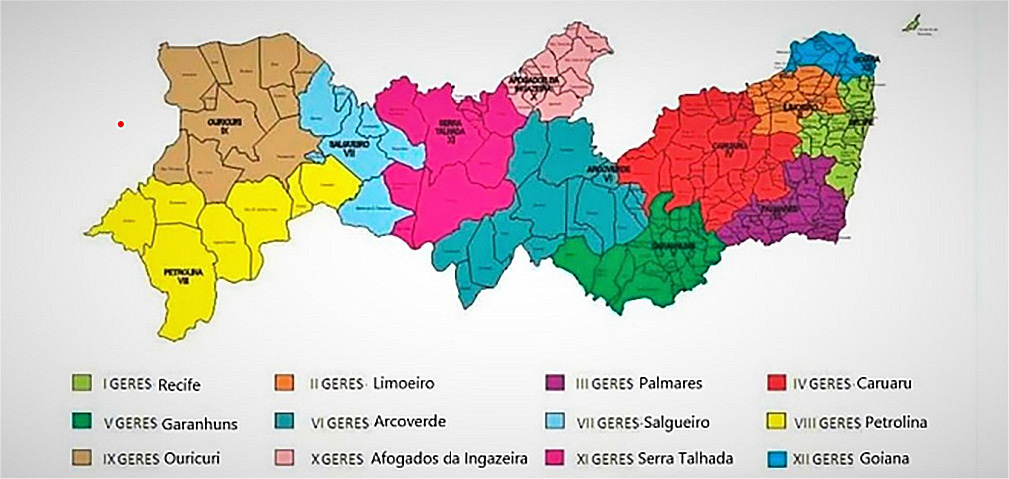
-
ORIGINAL ARTICLE11-22-2024
Evaluation of a video to promote HIV testing in sexual minorities
Revista Brasileira de Enfermagem. 2024;77(4):e20230320
Abstract
ORIGINAL ARTICLEEvaluation of a video to promote HIV testing in sexual minorities
Revista Brasileira de Enfermagem. 2024;77(4):e20230320
DOI 10.1590/0034-7167-2023-0320
Views0See moreABSTRACT
Objective:
To design and evaluate an educational video aimed at promoting HIV testing in gay men from the theoretical perspective of the Nola J. Pender Health Promotion Model.
Methods:
The design comprised five steps: 1.- Literature search; 2.- Formulation of the educational objective; 3.- Drafting of the script and location of the information in the theoretical components; 4.- Production; and 5.- Evaluation by experts and the target population.
Results:
The video “Living Without Fear” was produced, which presents the dilemma faced by gay men before taking a HIV test. The content validity index was 0.85, which indicated that the information was adequate and acceptable for promoting the rapid HIV test.
Final Considerations:
The results contribute to the scientific evidence aimed at promoting healthy behavior. In addition, the video was shown to be an acceptable educational tool.
-
ORIGINAL ARTICLE11-22-2024
Development and validity of a mobile application prototype for hospital shift handover
Revista Brasileira de Enfermagem. 2024;77(4):e20230173
Abstract
ORIGINAL ARTICLEDevelopment and validity of a mobile application prototype for hospital shift handover
Revista Brasileira de Enfermagem. 2024;77(4):e20230173
DOI 10.1590/0034-7167-2023-0173
Views0See moreABSTRACT
Objective:
To develop and validate a mobile application prototype for nursing shift handover in a hospital inpatient unit.
Methods:
A methodological study of technological production, carried out from April 2020 to January 2022, for mobile application construction and validity through the Design Thinking methodology. The study involved the stages of prototype development and validity by experts.
Results:
The application for mobile nursing shift handover obtained a usability score of 79 points and a content validity coefficient of 0.7.
Conclusions:
The instrument obtained an excellent assessment according to usability and agreement among experts. However, future studies are needed to implement this technology in order to assess effectiveness, time optimization and failures during communication.
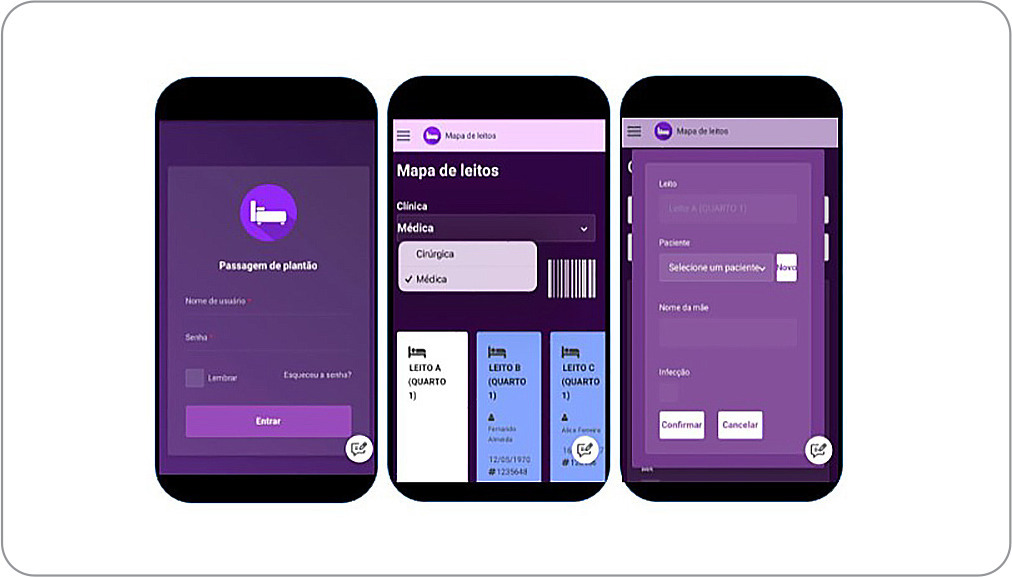
-
ORIGINAL ARTICLE10-25-2024
Analysis of the vaccination situation against Mpox in people living with HIV/AIDS: an ecological study
Revista Brasileira de Enfermagem. 2024;77(5):e20230234
Abstract
ORIGINAL ARTICLEAnalysis of the vaccination situation against Mpox in people living with HIV/AIDS: an ecological study
Revista Brasileira de Enfermagem. 2024;77(5):e20230234
DOI 10.1590/0034-7167-2023-0234
Views0See moreABSTRACT
Objectives:
to analyze the vaccination situation against Mpox in people living with HIV/AIDS in Brazil.
Methods:
an ecological study on the vaccination status against Mpox in people living with HIV/AIDS (PLWHA) in Brazil. The data were collected in April 2023 through information from the Ministry of Health, using the “Microsoft app Power BI,” which is publicly accessible.
Results:
the data analysis revealed that in Brazil, 2,978 doses of the MVA-BN Jynneos Mpox vaccine were administered in PLWHA, resulting in a vaccination coverage of 18.3%, with the southern and southeastern regions showing the lowest and highest vaccination coverage, respectively. Gender-based evaluation showed a higher proportion of vaccinated males.
Conclusions:
we identified low vaccination coverage in all regions of Brazil, highlighting the need for intensified vaccination activities, especially for PLWHA.
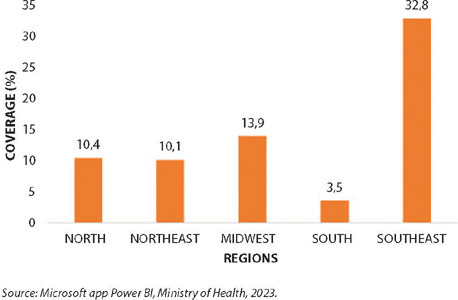
-
ORIGINAL ARTICLE10-11-2024
Indigenous women’s experiences about the pregnancy-puerperal cycle
Revista Brasileira de Enfermagem. 2024;77:e20230410
Abstract
ORIGINAL ARTICLEIndigenous women’s experiences about the pregnancy-puerperal cycle
Revista Brasileira de Enfermagem. 2024;77:e20230410
DOI 10.1590/0034-7167-2023-0410
Views0See moreABSTRACT
Objectives:
to understand the experiences of indigenous women regarding the pregnancy-puerperal cycle.
Methods:
qualitative, exploratory and descriptive research, carried out between May and August 2023 with 27 pregnant women from Indigenous Villages in Mato Grosso, Brazil, through open individual interviews. The data was analyzed using Reflexive thematic analysis.
Results:
data analysis resulted in the following themes: Cultivation of labor and birth in its natural and sacred path; Unique practices and beliefs associated with breastfeeding; Evolved or reductive thinking? The participants suggest inviolable practices and beliefs, which must be welcomed, respected and enhanced by indigenous health teams.
Final Considerations:
the experiences of indigenous women regarding the pregnancy-puerperal cycle are unique and motivated by inviolable cultural and religious beliefs, which transcend scientific knowledge, certainties and the linearity of contemporary approaches, normally established as order.
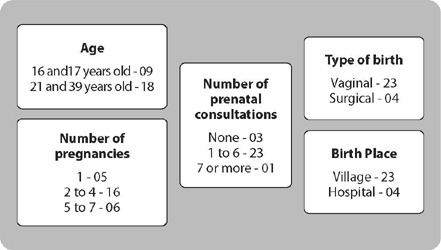
-
REVIEW10-07-2024
Risk factors associated with the occurrence of the adverse event phlebitis in hospitalized adult patients
Revista Brasileira de Enfermagem. 2024;77(5):e20240162
Abstract
REVIEWRisk factors associated with the occurrence of the adverse event phlebitis in hospitalized adult patients
Revista Brasileira de Enfermagem. 2024;77(5):e20240162
DOI 10.1590/0034-7167-2024-0162
Views0See moreABSTRACT
Objectives:
to synthesize knowledge regarding risk factors associated with occurrence of adverse event phlebitis in hospitalized adult patients.
Methods:
an integrative literature review, carried out in the CINAHL, PubMed, Virtual Health Library, Embase, Web of Science and Scopus databases. The stages were carried out independently by two reviewers, and the data were analyzed descriptively.
Results:
from the analysis of 31 quantitative primary studies, the following risk factors were summarized: length of stay; use of antibiotics; peripheral intravenous catheter dwell time; receive less nursing care; catheter inserted multiple times; patients with infection and comorbidities; presence of pain at catheter insertion site; Teflon® catheter use; reduced patient mobility; quality of patient’s vein; skin elasticity; unsuccessful insertion.
Conclusions:
it is necessary to standardize the format for measuring occurrence of this adverse event and develop new studies with a higher level of evidence.
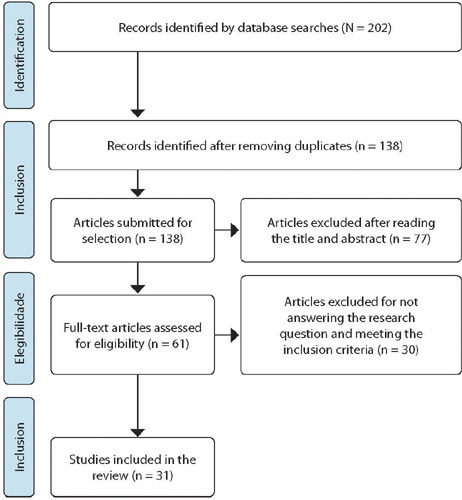
-
ORIGINAL ARTICLE10-07-2024
Indicators of emotional distress and mindfulness in undergraduate students: a cross-sectional study
Revista Brasileira de Enfermagem. 2024;77(5):e20230499
Abstract
ORIGINAL ARTICLEIndicators of emotional distress and mindfulness in undergraduate students: a cross-sectional study
Revista Brasileira de Enfermagem. 2024;77(5):e20230499
DOI 10.1590/0034-7167-2023-0499
Views0See moreABSTRACT
Objectives:
to assess the association between indicators of emotional distress and dispositional mindfulness in health students at a Brazilian federal public university.
Methods:
a cross-sectional study, developed with university students in the health area of a public institution from May to June 2022. In the analysis, multiple linear regression was used using SPSS software.
Results:
the sample was mostly female, ≤ 22 years old, non-white, studying the first semesters, with a higher prevalence for the medicine course. Students presented moderate dispositional mindfulness scores. It was observed that the variables of stress, depression and current suicide risk were associated with the capacity for mindfulness.
Conclusions:
knowing the indicators of emotional distress that are related to the potential of mindfulness can contribute as a situational diagnosis to better design strategies that promote the improvement of emotional indicators of health students.
-
ORIGINAL ARTICLE10-07-2024
Development and validation of a mobile application prototype for postoperative cardiac surgery
Revista Brasileira de Enfermagem. 2024;77(5):e20230491
Abstract
ORIGINAL ARTICLEDevelopment and validation of a mobile application prototype for postoperative cardiac surgery
Revista Brasileira de Enfermagem. 2024;77(5):e20230491
DOI 10.1590/0034-7167-2023-0491
Views0See moreABSTRACT
Objectives:
to develop and validate the content, appearance, and semantics of a prototype application for monitoring patients in the postoperative period of cardiac surgery.
Methods:
this is a technological development study based on Contextualized Instructional Design. The content and appearance evaluation was conducted by a committee of specialists, and semantic validation was carried out by patients from a cardiac surgery outpatient clinic.
Results:
the application prototype consisted of 43 screens, validated by 17 health specialists, with content validity ratio and appearance validity index results of 0.86 and 0.99, respectively. For semantic validation, 10 patients participated in data collection, with a total content validity index of 0.978.
Conclusions:
the prototype of the “VivaCor PósOp” application demonstrated evidence of content, appearance, and semantic validity, with the potential to stimulate self-care in patients in the postoperative period of cardiac surgery.
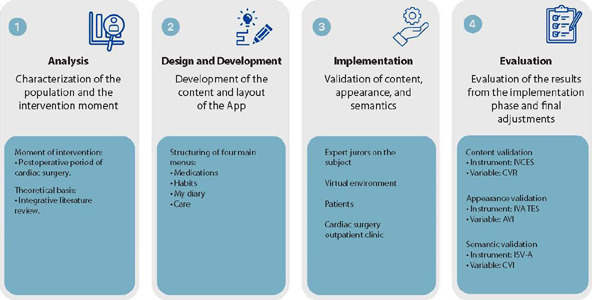
-
ORIGINAL ARTICLE12-16-2024
Health literacy development of Primary Health Care patients: qualitative research
Revista Brasileira de Enfermagem. 2024;77(6):e20240154
Abstract
ORIGINAL ARTICLEHealth literacy development of Primary Health Care patients: qualitative research
Revista Brasileira de Enfermagem. 2024;77(6):e20240154
DOI 10.1590/0034-7167-2024-0154
Views0See moreABSTRACT
Objectives:
to identify the process of health literacy development among primary care patients, relating it to their self-care practices.
Methods:
qualitative, prospective research with 22 patients from two Family Health Strategy units. Data were obtained through individual semi-structured interviews, examined through descriptive statistics and thematic content analysis.
Results:
the results discuss how participants learn about health and how this resonates in their behaviors, culminating in two thematic categories: “Health knowledge construction”; and “Dialogue between health knowledge construction and patient care actions”.
Final Considerations:
health knowledge is developed mainly through interpersonal relationships, mediated by health professionals through bonding and communication. Community educational actions and training of health professionals in communication can promote health literacy and self-care among patients.

-
ORIGINAL ARTICLE12-16-2024
Analysis of omission of antimicrobial doses in Intensive Care Units
Revista Brasileira de Enfermagem. 2024;77(6):e20240102
Abstract
ORIGINAL ARTICLEAnalysis of omission of antimicrobial doses in Intensive Care Units
Revista Brasileira de Enfermagem. 2024;77(6):e20240102
DOI 10.1590/0034-7167-2024-0102
Views0See moreABSTRACT
Objectives:
to analyze the rate of antimicrobial dose omission in intensive care units.
Methods:
cross-sectional study carried out between March 1 and September 30, 2023, in intensive care units of a University Hospital in Rio de Janeiro.
Results:
the sample consisted of 452 prescriptions and 1467 antimicrobial doses. The dose omission rate was 4.29%. Each antimicrobial prescribed increased the chance of omission by 51%. The strategy of double-checking prescriptions helped prevent 30% of antimicrobial dose omissions (p=0.0001).
Conclusions:
monitoring the omission of antimicrobial doses can guide nursing actions to improve quality and patient safety, contributing to the prevention of medication errors, antimicrobial stewardship and the fight against antimicrobial resistance.
-
REVIEW12-16-2024
Recommendations for guidelines for promoting mental health in the workplace: an umbrella review
Revista Brasileira de Enfermagem. 2024;77(6):e20240086
Abstract
REVIEWRecommendations for guidelines for promoting mental health in the workplace: an umbrella review
Revista Brasileira de Enfermagem. 2024;77(6):e20240086
DOI 10.1590/0034-7167-2024-0086
Views1See moreABSTRACT
Objectives:
to summarize the recommendations of guidelines for promoting mental health in the workplace.
Methods:
an umbrella review, according to Joanna Briggs Institute and Preferred Reporting Items for Systematic reviews and Meta-Analyses methodological assumptions. Data collection was carried out in January 2021 and updated in July 2023 in the American Psychological Association, Cochrane Library, EMBASE, National Library of Medicine, and Scopus databases. Systematic reviews that assessed guidelines with recommendations for mental health care for workers were included. PROSPERO registration CRD42023461845.
Results:
four systematic reviews published between 2015 and 2018 were identified. The abstracts highlighted actions that facilitate and inhibit the recommendations as well as three categories of intervention: primary prevention – worker protection; secondary prevention – promoting workers’ mental health; and tertiary prevention – supporting, monitoring and rehabilitating workers upon returning to work.
Conclusions:
the interventions are based on prevention, promotion and early recognition, support and rehabilitation of mental health problems.

-
ORIGINAL ARTICLE12-16-2024
Psychometric analysis of ProQOL-BR in nursing: building hospital safety and protection
Revista Brasileira de Enfermagem. 2024;77(6):e20240085
Abstract
ORIGINAL ARTICLEPsychometric analysis of ProQOL-BR in nursing: building hospital safety and protection
Revista Brasileira de Enfermagem. 2024;77(6):e20240085
DOI 10.1590/0034-7167-2024-0085
Views0See moreABSTRACT
Objectives:
to analyze the psychometric properties of the ProQOL-BR instrument in hospital nursing professionals.
Methods:
a methodological study to validate the ProQOL-BR. Confirmatory factor analysis, assessment of local and global adjustment quality, Pearson hypothesis testing and Cronbach’s alpha internal consistency analysis were used.
Results:
a total of 490 professionals participated. The model presents adequate quality due to factor weights (λ≥ 0.40), acceptable overall fit quality and adequate chi-square ratio and degrees of freedom (χ2/g.1=2.51) for the parameters of CFI (0.923), GFI (0.902), TLI (0.914) and RMSEA (0.042). In terms of validity, it was shown to be adequate with CC=0.89. The internal consistency obtained by standardized Cronbach’s alpha was 0.761. Criterion validity was shown to be favorable with significant correlations (0.001).
Conclusions:
the instrument was validated regarding content, criteria and reliability. Three questions were removed from the original instrument, ProQOL-BR, leaving the final instrument with 25 questions.

-
12-16-2024
GerenciaDOR™: development of digital technology by nurses for the assessment of patients with chronic pain
Revista Brasileira de Enfermagem. 2024;77(6):e20240050
Abstract
GerenciaDOR™: development of digital technology by nurses for the assessment of patients with chronic pain
Revista Brasileira de Enfermagem. 2024;77(6):e20240050
DOI 10.1590/0034-7167-2024-0050
Views0See moreABSTRACT
Objectives:
to develop a digital technological solution (prototype) for assessing patients with chronic pain.
Methods:
this is a methodological and technological development study based on the Human-Centered Design framework and the principles of Patient-Centered Care. The prototype guides patients through a body diagram and directs them to an evaluation using specific instruments that address the multidimensional aspects of chronic pain.
Results:
the GerenciaDOR* project enables navigation through the Web App screens, providing access to pain assessment features up to the presentation of results.
Final Considerations:
the study describes a systematic approach to pain assessment and expands nurses’ knowledge in pain management. Additionally, it can promote the development of other digital technologies for chronic pain assessment and contribute to a multidisciplinary, patient centered treatment.

-
ORIGINAL ARTICLE12-16-2024
Respectful care for postpartum women with sickle cell disease: a netnographic study
Revista Brasileira de Enfermagem. 2024;77(6):e20230545
Abstract
ORIGINAL ARTICLERespectful care for postpartum women with sickle cell disease: a netnographic study
Revista Brasileira de Enfermagem. 2024;77(6):e20230545
DOI 10.1590/0034-7167-2023-0545
Views0See moreABSTRACT
Objectives:
to analyze principles of respectful maternity care in narratives of postpartum women with sickle cell disease, relating them to Sustainable Development Goals.
Methods:
netnographic study, with two videos published in 2020. Deductive iconographic and thematic analysis by Respectful Maternity Care Charter, organized in MAXQDA.
Results:
principles identified were the right to: freedom from harm and ill-treatment; information, informed consent, refusal of medical procedures, and respect for their choices and preferences including companion; be considered a person from birth, with dignified and respectful treatment; health at the highest possible level; newborns being with their parents or guardians. The Sustainable Development Goals for women by 2030 were not positively contemplated in postpartum women’s experience.
Final Considerations:
it is appropriate that health workers qualify themselves to provide respectful maternity care, with qualified listening, understanding, and resolution of unique demands of postpartum women with sickle cell disease, seeking equality in care for women.

-
ORIGINAL ARTICLE12-16-2024
Construction and validation of an educational game on biosafety in the central sterile supply department
Revista Brasileira de Enfermagem. 2024;77(6):e20230478
Abstract
ORIGINAL ARTICLEConstruction and validation of an educational game on biosafety in the central sterile supply department
Revista Brasileira de Enfermagem. 2024;77(6):e20230478
DOI 10.1590/0034-7167-2023-0478
Views0See moreABSTRACT
Objectives:
to construct and validate an educational game on biosafety in the Central Sterile Supply Department of a hospital in Curitiba, PR.
Methods:
the study was conducted using a quantitative approach, employing applied and technological research with an exploratory design. The process was divided into six stages, from the definition of the theme to the validation and application of the game. The study was carried out from May to August 2022, involving 17 nursing professionals from a Central Sterile Supply Department during day and night shifts, as well as 9 judges.
Results:
the study resulted in the construction of a board game named by the authors as “My Health First.”
Conclusions:
the research achieved its objective of constructing and validating an educational game. By reflecting on professional practice and correlating the occupational risks present, the professionals were able to list safe actions, identify problems, and seek solutions.

-
ORIGINAL ARTICLE12-16-2024
Training profile of intensive care nurses in Brazil: cross-sectional study
Revista Brasileira de Enfermagem. 2024;77(6):e20230460
Abstract
ORIGINAL ARTICLETraining profile of intensive care nurses in Brazil: cross-sectional study
Revista Brasileira de Enfermagem. 2024;77(6):e20230460
DOI 10.1590/0034-7167-2023-0460
Views0See moreABSTRACT
Objectives:
to describe the training profile of Brazilian intensive care nurses.
Methods:
a cross-sectional study carried out in two stages: a structured, self-administered questionnaire; mapping of the national supply of lato sensu postgraduate courses. Data was collected on the sociodemographic profile, training process and characterization of the courses.
Results:
in the first stage, 202 respondents were obtained. The majority were women (79.2%), aged between 26 and 45 (80.7%), graduated less than 5 years ago (44%), through lato sensu postgraduate courses (55.5%), which were marked by the absence of laboratory practice (57.5%) and guided tours (42.5%). In the second stage, 457 courses were identified, with face-to-face teaching (58.9%), a workload of 360 to 420 hours (51.2%), a duration of up to 6 months (41.8%) and variation in the sub-area of training.
Conclusions:
there was a predominance of professionals graduating from lato sensu post-graduate courses, with essentially theoretical teaching and heterogeneity in terms of modality, workload and sub-area of training.
-
REFLECTION09-23-2022
Legislation and quality of nursing education in the context of the COVID-19 pandemic
Revista Brasileira de Enfermagem. 2022;75(3):e20210825
Abstract
REFLECTIONLegislation and quality of nursing education in the context of the COVID-19 pandemic
Revista Brasileira de Enfermagem. 2022;75(3):e20210825
DOI 10.1590/0034-7167-2021-0825
Views0See moreABSTRACT
Objectives:
to reflect on the governmental normative acts issued for higher education during the COVID-19 pandemic and on the repercussions of these acts on the quality of nursing education in Brazil.
Methods:
this is a reflection on the repercussions for the quality of nursing education, based on the normative acts applied to higher education, enacted from March to December 2020, available on the Ministry of Education website and in the current literature on the subject anchored in the National Curriculum Guidelines for the Undergraduate Nursing Course.
Results:
educational legislation, in the context of the pandemic, distanced education from the world of work, as well as from the quality of training established in the guidelines.
Final Considerations:
remote teaching in nursing makes it difficult to train professionals with the capacity to effectively teach and learn in the real world of care and health promotion in the Unified Health System.
-
REFLECTION09-23-2022
Perioperative nursing education in Brazil: reviewing the past to survive the future
Revista Brasileira de Enfermagem. 2022;75(3):e20210331
Abstract
REFLECTIONPerioperative nursing education in Brazil: reviewing the past to survive the future
Revista Brasileira de Enfermagem. 2022;75(3):e20210331
DOI 10.1590/0034-7167-2021-0331
Views0See moreABSTRACT
Objectives:
to summarize historical aspects related to perioperative nursing education in Brazil and to outline future perspectives.
Methods:
a descriptive-reflexive essay about the historical process of Brazilian perioperative teaching at undergraduate and graduate levels.
Results:
the reflection addresses the historical axes of perioperative nursing, teaching perioperative nursing, curriculum changes, graduate studies and relationship with the perioperative period and trends in perioperative nursing education. Curriculum changes reduced time available for teaching and learning, with a focus on the perioperative period, and diluted contents of surgical nursing in other subjects, which could cause irreversible losses for generalist nurses’ training.
Final Considerations:
when reviewing historical aspects of national nursing curricula, it was found that the nomenclature perioperative nursing was never used in the curriculum, however, the surgical area has always been contemplated in undergraduate and graduate studies. Future trends indicate the need to integrate themes and prepare professionals with perspectives focused on global health and technology.
-
ORIGINAL ARTICLE09-19-2022
Implications of health conditions on rural soybean workers’ quality of life
Revista Brasileira de Enfermagem. 2022;75:e20210983
Abstract
ORIGINAL ARTICLEImplications of health conditions on rural soybean workers’ quality of life
Revista Brasileira de Enfermagem. 2022;75:e20210983
DOI 10.1590/0034-7167-2021-0983
Views0See moreABSTRACT
Objective:
to analyze the implications of health conditions on rural workers’ quality of life in the context of soybean production.
Method:
a cross-sectional study, with an intentional sample of 299 male rural workers. Data collection took place between October and December 2019. The following instruments were used: World Health Organization Quality Life-bref; Rural Workers’ Living & Health Conditions questionnaire; International Physical Activity Questionnaire; Cut down, Annoyed, Guilty, and Eye-opener. They were analyzed via descriptive and inferential statistics, using bivariate (Mann-Whitney; Kruskal-Wallis) and multivariate tests (generalized additive models for location, scale and shape).
Results:
the presence of a diagnosis of morbidity, alcohol dependence, occupational accidents and absenteeism implied a decrease in workers’ quality of life scores.
Conclusion:
the existence of unfavorable health conditions has a negative impact on rural soybean workers’ quality of life.
-
REVIEW09-19-2022
Onco-hematological patient care in times of COVID-19: a scoping review
Revista Brasileira de Enfermagem. 2022;75:e20210892
Abstract
REVIEWOnco-hematological patient care in times of COVID-19: a scoping review
Revista Brasileira de Enfermagem. 2022;75:e20210892
DOI 10.1590/0034-7167-2021-0892
Views0See moreABSTRACT
Objective:
to identify and map health care aimed at onco-hematological patients in times of Coronavirus 2019.
Methods:
this is a scoping review, anchored in the Joanna Briggs Institute theoretical framework, registered in the Open Science Framework, with searches carried out in June 2021, through searches in the databases.
Results:
a final sample consisting of 20 articles was obtained, with emphasis on general care, treatment and stem cell donation. The most reported care was the use of telemedicine, screening for Coronavirus Disease 2019, compliance with prevention practices and, in case of infection, postponing procedures.
Conclusions:
the study gathered the main evidence on care aimed at treating these patients in times of a pandemic. Such measures help in the clinical management with the objective of proceeding with treatment amidst the injuries caused, thus minimizing possible complications.
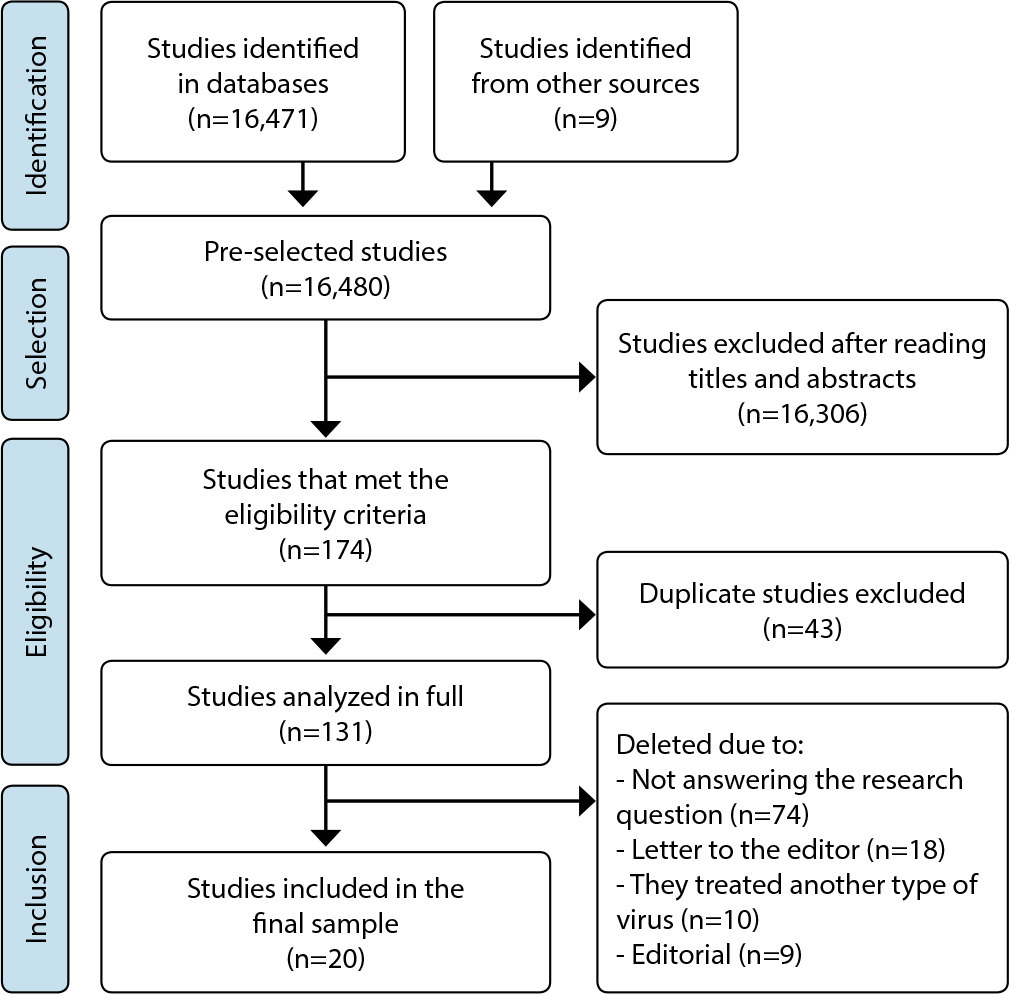
-
ORIGINAL ARTICLE09-19-2022
Terminological relationships between nursing diagnoses for children with kidney diseases
Revista Brasileira de Enfermagem. 2022;75:e20210841
Abstract
ORIGINAL ARTICLETerminological relationships between nursing diagnoses for children with kidney diseases
Revista Brasileira de Enfermagem. 2022;75:e20210841
DOI 10.1590/0034-7167-2021-0841
Views0See moreABSTRACT
Objective:
To identify the relationships between the statements of nursing diagnoses for children with kidney diseases prepared according to the International Classification for Nursing Practice (ICNP®) with the diagnoses of NANDA International (NANDA-I).
Methods:
Methodological study operationalized by the steps: 1) Survey of clinical findings through interviews and physical examination with children; 2) Elaboration of nursing diagnoses through Gordon’s clinical judgment; 3) Cross-mapping of diagnostic statements between the NANDA-I and ICNP® classification systems; 4) Content validation using the Delphi technique, in two rounds, with specialist nurses.
Results:
90 children participated. A total of 151 diagnoses were made, of which 66.3% (n=100) used ICNP® terminology and 33.7% (n=51) used NANDA-I; 55 diagnoses showed equivalence of meanings.
Conclusions:
Cross-mapping of diagnoses was achieved starting from the reality of children, using clinical reasoning and validation by specialist nurses.
-
ORIGINAL ARTICLE09-19-2022
The experience of trans or transvestite women in accessing public health services
Revista Brasileira de Enfermagem. 2022;75:e20210713
Abstract
ORIGINAL ARTICLEThe experience of trans or transvestite women in accessing public health services
Revista Brasileira de Enfermagem. 2022;75:e20210713
DOI 10.1590/0034-7167-2021-0713
Views0See moreABSTRACT
Objective:
to understand the meanings of being a trans or transvestite woman in the care provided by Unified Health System health professionals.
Methods:
qualitative research, guided by Heidegger’s phenomenology, with 10 trans or transvestitewomen residing and using the Unified Health System in a municipality in Minas Gerais. Fieldwork was carried out by interviews.
Results:
trans or transvestitewomen reproduce the social patterns constructed and accepted by the female, with the search for hormonization being common, and, when it is difficult to obtain a prescription, they resort to self-medication. Social name use and acceptance by health professionals promote recognition. Trans or transvestitewomen experience prejudice on a daily basis, not only by professionals, but also because of the assumption of diagnoses by other users.
Final considerations:
transphobia promotes withdrawal from health services, due to fear, shame, knowledge about professionals’ unpreparedness, triggering illness, social exclusion and violence.
-
ORIGINAL ARTICLE09-19-2022
Neurobehavioral signals in preterm infants in body weight check: a quasi-experimental study
Revista Brasileira de Enfermagem. 2022;75:e20210584
Abstract
ORIGINAL ARTICLENeurobehavioral signals in preterm infants in body weight check: a quasi-experimental study
Revista Brasileira de Enfermagem. 2022;75:e20210584
DOI 10.1590/0034-7167-2021-0584
Views0See moreABSTRACT
Objective:
to describe and compare the frequency of neurobehavioral signs in preterm infants in traditional and humanized body weight check.
Methods:
a quantitative, quasi-experimental, cross-over study, carried out in a Neonatal Unit at a university hospital with a sample of 30 preterm newborns, randomly assigned and allocated in control group (traditional) and intervention group (humanized), with collection of general data, vital signs before and after procedures and footage.
Results:
there was a higher frequency of approach signs in humanized weight check compared to traditional check. Moreover, withdrawal signs were more frequent in traditional weight check compared to humanized check.
Conclusion:
in this regard, humanized body weight check provided greater benefits to preterm infants, making it necessary to foster discussions about humanization of care, so that this practice can be performed routinely in health units.
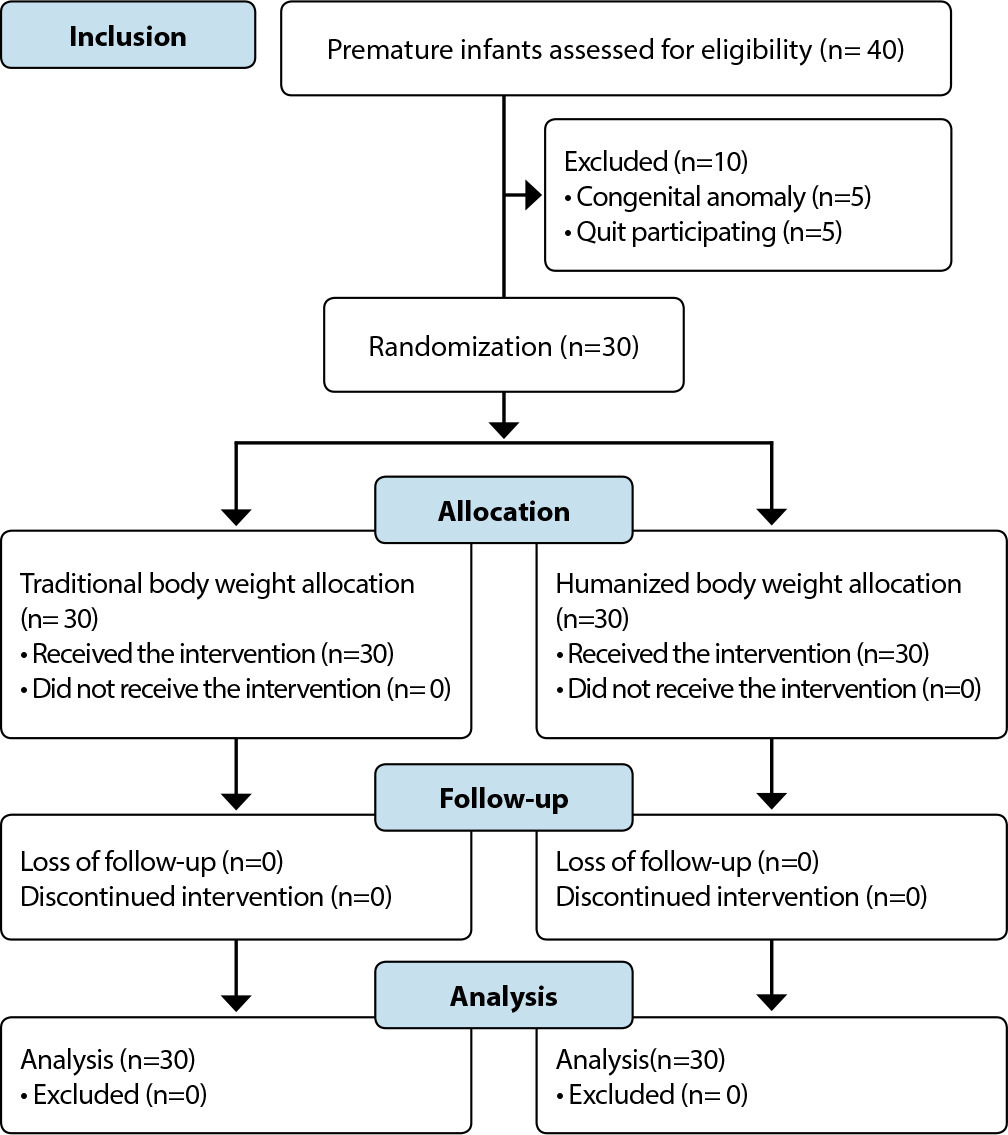
-
ORIGINAL ARTICLE09-19-2022
Colorectal cancer mortality in women: trend analysis in Brazil and its regions and states
Revista Brasileira de Enfermagem. 2022;75(2):e20210751
Abstract
ORIGINAL ARTICLEColorectal cancer mortality in women: trend analysis in Brazil and its regions and states
Revista Brasileira de Enfermagem. 2022;75(2):e20210751
DOI 10.1590/0034-7167-2021-0751
Views0See moreABSTRACT
Objectives:
to analyze colorectal cancer mortality trends in women in Brazil and its regions and states.
Methods:
ecological, time-series study with trend analysis of deaths caused by colorectal cancer in women in Brazil and its regions and states between 2008 and 2019. Polynomial regression was used to treat the data.
Results:
48,225 deaths of women caused by colorectal cancer were examined. There was an increasing mortality trend in Brazilian women, with regional differences that resulted from socioeconomic, political, and cultural inequalities. The South Region stood out with the highest rate (7.32) in 2008, which increased to 8.65 in 2019, followed by the Southeast Region, whose rates were 6.72 and 9.05 in 2008 and 2019, respectively.
Conclusions:
colorectal cancer mortality increased, which indicates the need to expand public policies oriented toward screening and early diagnosis of colorectal cancer in women.
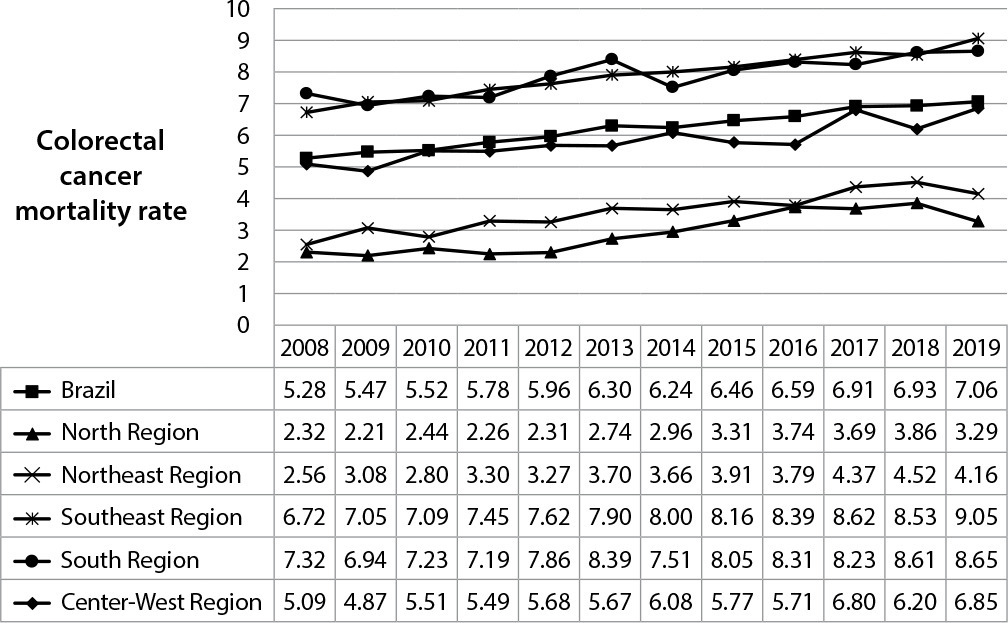
Search
Search in:
Nuvem de Tags
Adolescente (85) Atenção Primária à Saúde (239) COVID-19 (91) Criança (91) Cuidados de Enfermagem (269) Educação em Enfermagem (151) Educação em Saúde (139) Enfermagem (930) Enfermagem Pediátrica (86) Estudantes de Enfermagem (77) Estudos de Validação (131) Família (87) Idoso (208) Promoção da Saúde (99) Qualidade de Vida (104) Saúde do Trabalhador (86) Saúde Mental (145) Saúde Pública (82) Segurança do Paciente (150) Tecnologia Educacional (100)



